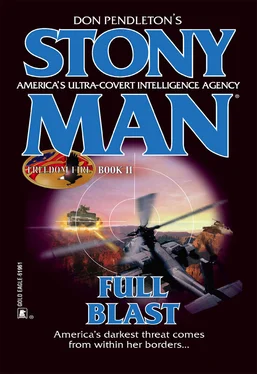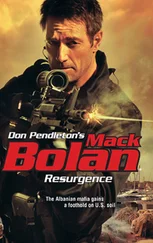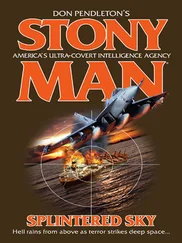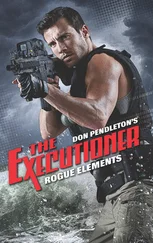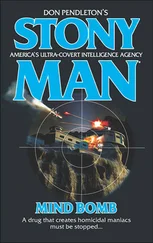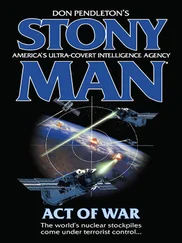They have a prisoner,” Abdul said. “Dushinov has a prisoner.”
Khariza followed Wafiq outside, pulling on his thick leather coat against the damp chill. He saw Zoltan Dushinov drag a bound figure from the rear of a battered pickup and throw it to the stony ground. When Dushinov looked up and saw Khariza, he raised a hand to beckon the Iraqi to join him, a satisfied smile on his bearded face.
“Didn’t I tell you they were looking for you?” Dushinov said. “Now you see I was right.”
“I believed you before, Zoltan. Why would I not?”
Dushinov dismissed the words with a shrug.
“This one was found trying to locate the camp. He had a guide. Some local from one of the villages. My men dealt with him. When the villagers find him and see what my men did, they will think twice before selling us out next time.”
Khariza reached the pickup and stood over the bloody, huddled figure on the ground. His clothing was torn and filthy. His feet were bare where someone had taken his boots and socks. His arms had been pulled behind him and tied high up his back with a length of rope taken around his neck.
“Who is he?”
Dushinov reached down and caught hold of the man’s hair, using it to pull him to his knees. The man’s face turned up, eyes meeting Khariza’s. He had already undergone a severe beating. His skin was heavily bruised and bloody. There was a deep gash across one cheek, bone gleaming white through the blood.
“He is an American,” Dushinov said loudly so that everyone could hear. “One of our enemies to be feared. Look at him, my brothers. Look at him and tremble. This is the great enemy who is going to conquer us all. Are you afraid?”
There was a raised yell of defiance from the gathered men. They moved to stare at the man on the ground, gesturing with their weapons and voicing their contempt.
“Here is your American, Razan. I give him to you as a gift. If you ask he may tell you why he is looking for you.”
“Take him inside,” Khariza ordered.
The American was dragged to his feet and taken to one of the buildings. Khariza followed slowly, his mind busy with questions he wanted to ask the prisoner. He wished he had Barak with him. The man had the skill to pull information from anyone. He was patient, thorough and dedicated to his work. And he was extremely loyal to Khariza. But now he was on Zehlivic’s motor vessel, Petra, somewhere off the North African coast where he was dealing with a matter allied to a Mossad agent named Sharon. The Israeli had been part of the group that had intercepted the team inserted into Israel as part of the strike against the nuclear plant at Dimona. The advance team had been killed, the plane on its way to carry out the attack intercepted and brought down.
The mission to destroy Dimona had been important—planned to demoralize the Israelis—and its loss was a definite blow. Khariza had taken the news badly at first but had pushed aside his disappointment, especially in front of his people. He had to remain strong and to show that defeats had to be borne with strength. Later, alone, he had reviewed the way his plans were going. The strike at Bucklow had achieved its purpose: a significant blow against the Americans. An added disappointment had come with the news that the second MOAB had been retaken by an American strike team and Khariza’s men defeated.
Khariza, in his solitary room, had sat facing the blank wall. His mind alive with thought. So many things he was dealing with; ongoing plans, logistics, financial matters. The dealing and bargaining to obtain the Massive Ordnance Air Burst and allied equipment he needed. The endless conversations with his people who were located in many different places. There was a great deal to maintain. So many people to keep updated and at one with their faith. For some, the smallest loss became almost total defeat. Khariza had had to employ his skills as an orator to allay their fears. Persuading, promising, soothing, he became all things to all men, and it was only when he was alone that he found himself questioning and calming his own deep, inner fears.
It wasn’t that he was ready to surrender, to call off the campaign that stretched across the Middle East and all the way to the American mainland. Khariza was, if nothing, a man at ease with himself and his objectives. His cause was just. He was doing it for God and for Iraq. Secretly, almost with a little embarrassment, he admitted that he was also doing it in part for himself. Since the capture of Iraq’s ex-president, Saddam Hussein, there had been a leadership vacuum. The current structure wasn’t proving fully successful. The diversity of tribal culture, of in-fighting and mistrust between interested groups, had led to a continual atmosphere of hostility. The random acts of violence perpetrated by insurgent groups, the destruction and killing, went on. Khariza had seen all this and the opportunity for someone to step in a take the country back—by force if necessary. He saw himself as that man. The prize was worth the risk.
Stakes were high, of course, so the need for grand gestures and hard action had become the only way. Khariza had no problems with that. The danger held no fear for him. He had lived most of his adult life on the edge, using his power and influence as tools to further his position. He knew and accepted the risks. There was a part of him that kept urging him to accept his fate. To acknowledge that he, Razan Khariza, was the man to step into the void left by Hussein. The former president of Iraq wasn’t going to return. His time was over and if the country was to have a new leader it needed someone with the strength of purpose and the will to do whatever became necessary, no matter how drastic.
Khariza believed he had those qualities. He also had the means to boost his credibility, namely the vast amounts of money that had been banked during the Hussein regime. Those funds were now under his control, and they gave him the buying power to gather what he wanted. He already had his three nuclear devices, and as long as they remained in his hands his bargaining was unbeatable. The nuclear gamble, if it paid off, could push him to the top. If it failed and he was pressured into actually using the bombs, Khariza was prepared to take that final extra step. He would deny the country to the enemy, even if it did exact his life as the ultimate price. He was aware of the obstacles in his way. The struggle that lay ahead made him pause, but only for a short time. If he lacked faith in himself, how could he expect others to follow and stay the course? He pushed aside thoughts of defeat and concentrated on the matters at hand.
Entering the building where the American had been taken, Khariza made his way to the room used as a cell and closed the door. The prisoner had been pushed against the far wall. He held himself as straight as was possible, restricted by the ropes binding his arms. Khariza crossed the room to stand in front of the man.
“What agency do you work for?”
The man remained silent.
“CIA? One of the other American agencies? Perhaps you are military? On a covert assignment for the Pentagon? We both know you have to be working for someone. You did not come here on a vacation. So why not tell me and let us get this over with. Cooperate, and I may even let you live. Force me to kill you and we will never know if I might have spared you. As admirable as your resistance is, how would your death profit me?”
“I guess we’ll have to find out,” the prisoner said.
Khariza gave a slight nod of his head, turning aside so that the two Chechens had room to confront the captive. They used their fists and feet, beating the prisoner until he was unable to stand, then continued when he lay on the floor. Finally they stepped back and allowed Khariza to resume his questioning. The American lay in a pool of his own blood, barely able to raise his head when Khariza squatted in front of him.
Читать дальше
